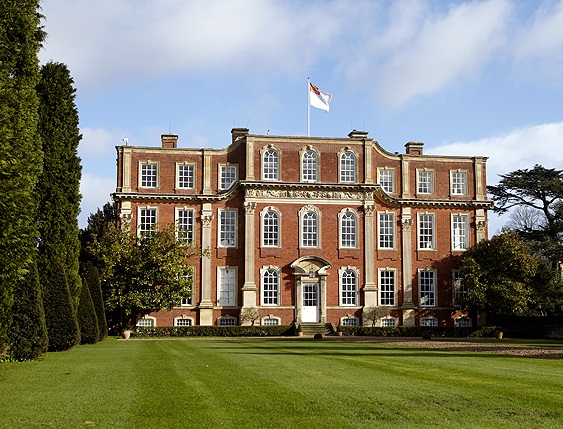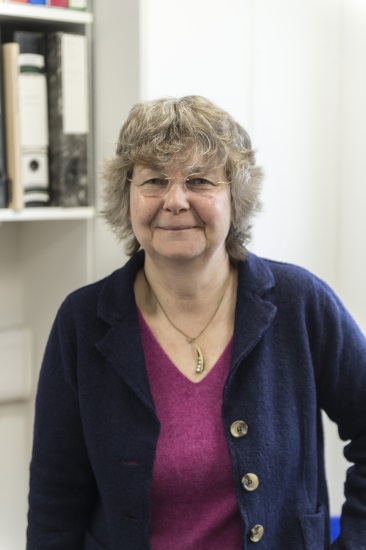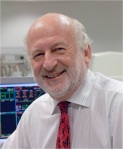Links to external sources may no longer work as intended. The content may not represent the latest thinking in this area or the Society’s current position on the topic.
Social programme: Fellows' research weekend on 'Communicating Science'

An opportunity for Fellows of the Royal Society to meet and socialise whilst discovering and sharing science.
Research weekends at Chicheley Hall are part of the Fellows' social programme. These relaxed weekends allow you and your guests to socialise and take part in informal discussions and talks on a range of scientific topics.
Join hosts Professor Carlos Frenk CBE FRS and Professor Cathie Martin MBE FRS for the next Fellows' Research Weekend, which will take place on 2-3 November 2019 Each day features a series of relaxed talks, lively discussion and opportunities to enjoy the surroundings of Chicheley Hall.
Please see below for the current programme, including our confirmed speakers: Professor Alison Smith OBE FRS, Professor Chris Frith FBA FMedSci FRS, Dame Ottoline Leyser DBE FRS, Professor John Pickett CBE FRS, Professor Saiful Islam and Professor Uta Frith DBE FBA FMedSci. There will also be a conversation with Professor Brian Cox OBE FRS, led by Dr Andrew Pontzen. If you would like any more information please contact the Scientific Programmes team.
Schedule
| 13:30 - 13:45 | Welcome by hosts |
|---|---|
| 13:45 - 14:35 |
Communicating science: two cultures revisited
According to popular conception, science is the domain of boffins, who are simultaneously super-human because they are extremely clever, and sub-human because they are entirely rational using only pure logic to make progress. We, as scientists, quite often reinforce these notions. We like to think we are extremely clever and that what we do is too difficult for others; and we like to think that we are on an inexorable march to truth, which helps us to cope with the uncertainty and insecurity inherent in the process of discovery. At the same time, for the rest of society, that science is too difficult to understand provides an excuse for not engaging, and that it is driven by robotic logic makes it either a silver bullet or a dangerous subversion of nature. Either way, it’s somebody else’s responsibility. This makes the mythological view of science as the province of boffins pervasive, hard to shift and extremely damaging. It limits access to science at a time when its multi-faceted role as a force for social good is badly needed. Communicating science effectively requires taking into account, and working to dispel this pervasive unhelpful framing. 
Professor Ottoline Leyser CBE FRS, Sainsbury Laboratory, University of Cambridge UK

Professor Ottoline Leyser CBE FRS, Sainsbury Laboratory, University of Cambridge UK
"Ottoline Leyser is Professor of Plant Development and Director of the Sainsbury Laboratory at the University of Cambridge. Her research uses the control of shoot branching in Arabidopsis as a model system to understand plant developmental plasticity and the role of plant hormones in integrating endogenous and environmental inputs into developmental regulation. The aim is to understand how local and systemic signalling mechanisms give rise to environmentally sensitive shoot system architectures, an endeavour that is increasingly dependent on computational modelling to understand the dynamic networks involved.
Ottoline received her BA (1986) and PhD (1990) in Genetics at the University of Cambridge. After a period of post-doctoral research at Indiana University, she returned to the UK and took up a Lectureship at the University of York (1994), where worked until moving to the new Sainsbury Laboratory University of Cambridge, in 2011. She is a Fellow of the Royal Society, a Member of EMBO and a Foreign Associate of the US National Academy of Sciences. She was awarded a CBE in the 2009 New Year Honours list." |
| 14:35 - 15:25 |
Atomic-Scale insights into energy materials (batteries included)
The supply of clean sustainable energy is one of the greatest challenges of our time. Major breakthroughs in energy technologies require advances in new materials and underpinning science. Indeed, a greater fundamental understanding of materials for batteries and solar cells requires characterization of their structural and transport behaviour. With the aid of 3D glasses, this talk highlights the use of advanced modelling methods in synergy with experimental work to gain atomic-scale insights into novel materials for lithium-ion batteries [1] and perovskite solar cells [2]. Parts of his academic career will also be discussed including how he ended up giving the 2016 Royal Institution Christmas Lectures on BBC TV. (1) Y Li et al, Nature Mater., 17, 915 (2018) 
Professor Saiful Islam, University of Bath, UK

Professor Saiful Islam, University of Bath, UKSaiful Islam is Professor of Materials Chemistry at the University of Bath and recipient of the Royal Society Wolfson Research Merit award. He grew up in Crouch End, north London and obtained his Chemistry degree and PhD from University College London, followed by a Postdoctoral Fellowship at the Eastman Kodak Labs in New York, USA. He returned to the UK to the University of Surrey, before joining the University of Bath in 2006. His research covers materials modelling for clean energy applications focusing on lithium batteries and perovskite solar cells. He has presented over 65 invited conference talks, and was awarded the Peter Day Award for Materials Chemistry (2017) of the Royal Society of Chemistry. Saiful served on Diversity Committee of the Royal Society, and is a Patron of Humanists UK. He presented the Royal Institution Christmas Lectures in 2016 for BBC TV on the theme of energy. Outside interests include family breaks, football, indie music (The Smiths et al) and the chemicals gin and tonic. |
| 15:25 - 16:00 | Tea break |
| 16:00 - 17:00 |
Using comics to communicate science: are you serious?
Traditionally, written prose is beautifully suited to convey what you want to say, with pictures only a means to attract your attention. But there is a hybrid form, the comic strip. It’s not just a combination of text and pictures, it’s a form that demands the reader understand both. It is possible to alternate pictures and text, but the hybrid idea is a great challenge. Whereas it is often tempting to hide a vague idea behind competent prose, comics only work if the idea is clear and easy to understand. However, comic strips tend to be very short, illustrating just one idea, often designed to grab your attention and make you smile. This is not good enough for science communication. The ideas we wish to convey need to be put into context. They need to be seen as part of a much wider story. This is why we favoured the form of a graphic novel for our current attempt to summarise what we know about Social Cognition. Here we tried to reduce complex ideas into manageable packages of information, spark readers’ curiosity, guide them to connect critical aspects of the information and even have some fun. 
Professor Uta Frith DBE FBA FMedSci FRS, UCL, UK

Professor Uta Frith DBE FBA FMedSci FRS, UCL, UKUta Frith is Emeritus Professor of Cognitive Development at the Institute of Cognitive Neuroscience at University College London. As MRC Scientist from 1968 to 2006 she carried out research on neurodevelopmental disorders, with the aim to understand the links between mind, brain and behaviour in autism and dyslexia. She has a special interest in science communication and public engagement. This has resulted in TV documentaries about her work for BBC Horizon and in a graphic non-fiction book. Together with her husband, Chris Frith, she is writing a book entitled What makes us social. Uta was chair of the Royal Society’s Diversity Committee from 2015–2018. She has raised awareness of the value of diversity in making group decisions and has produced guidelines and visual materials to explain and combat unconscious bias. 
Professor Chris Frith

Professor Chris FrithChristopher D. Frith FRS FBA is Emeritus Professor of Neuropsychology in the Wellcome Trust Centre for Neuroimaging at University College, London, and Niels Bohr Visiting Professor in the Interacting Minds project at the University of Aarhus, Denmark. He is one of the pioneers in applying brain imaging to the study of mental processes. He is known especially for his work on agency, social intelligence, and understanding the minds of people with autism and schizophrenia. |
| 17:00 - 18:00 |
In conversation with Brian Cox
Dr Andrew Pontzen will lead a conversation with Professor Brian Cox OBE FRS 
Dr Andrew Pontzen, University College London, UK

Dr Andrew Pontzen, University College London, UKI am a Royal Society University Research Fellow and Professor of Cosmology at University College London. I have been involved in public engagement throughout my Fellowship, with activities including talks in schools; contributing to TV, radio and print media; and delivering a three-week event in the Grizedale Forest (supported by Royal Society Public Engagement funding). By building an art exhibition, we aimed to build two-way in-depth dialogue with communities in this remote area of Cumbria around the nature and future direction of theoretical physics. My research focuses on understanding dark matter – a mysterious component of the universe that is hypothesised to drive the formation of galaxies and other structures. While little is known about the nature of dark matter, the basic idea of an invisible sector interacting through gravity with what we can see has been highly predictive. Over the last 20 years, the dark matter hypothesis has generated a huge number of correct predictions about both the present day universe and the ancient "cosmic microwave background" light. My team's work focuses largely on using the visible universe to help us to understand better how the invisible sector operates. This is essential if we are to connect our expanding knowledge of the night sky to fundamental physics experiments performed here on Earth. Ultimately this work should point us to a fuller understanding of the basic building blocks of reality. More specifically, my team use a combination of mathematical and computational tools to make predictions for how dark matter should behave in different circumstances. We work on building more precise, controlled numerical "experiments" using powerful supercomputers. We then interpret the results to make predictions for new observations of the real universe, or to explain existing ones. In this way we are attempting to understand how the visible and invisible components of our universe interact. |
| 10:00 - 10:15 | Welcome by hosts |
|---|---|
| 10:15 - 11:05 |
Inside a leaf at night
Photosynthesis has allowed plants to conquer and shape the surface, the biosphere and the atmosphere of the Earth. Photosynthesis takes up about 20% of the carbon dioxide in the atmosphere each year, and is the source of essentially all of the organic molecules on the planet. It is of course dependent on light, yet on our rotating planet organisms receive light for only half of their lives. What do they do in darkness? Darwin and contemporaries believed that many plants “sleep” at night – an anthropocentric interpretation of the drooping of their leaves in darkness. However this is far from the truth. In the last two decades, experimentation and modelling has revealed complex and sophisticated mechanisms that operate in leaves in darkness. Rather than responding passively to the onset of darkness, plants prepare for nightfall and anticipate when dawn will come so that the products of photosynthesis are used efficiently across each day-night cycle. The need to understand the factors determine plant growth has never been more urgent. Humankind needs more food, in the face of climate change and the phasing out of unsustainable agricultural practices. The focus of research has been strongly on photosynthesis itself, but understanding the other half of the lives of plants should also be a priority. 
Professor Alison M. Smith, John Innes Centre, UK

Professor Alison M. Smith, John Innes Centre, UKAlison Smith is the Programme Leader for plant and microbial metabolism (at the John Innes Centre in Norwich, UK, and an Honorary Professor at the University of East Anglia in Norwich. Her interest is in the synthesis and degradation of starch and sugars in relation to plant growth and development. Her lab studies both “model” plants and crop plants including barley and wheat: research topics include how carbon assimilated in photosynthesis is partitioned between sugars and starch, how sugars arriving in non-photosynthetic organs are partitioned between metabolism and storage, and how the degradation of starch is co-ordinated with the requirement for sugars for metabolism and biosynthesis – in leaves at night and in non-photosynthetic organs. Alison also has a broad interest in how fundamental discoveries about plant biology can be used to promote crop productivity and enhance food security in the face of climate change. |
| 11:05 - 11:55 |
Engaging the public on pesticides and GM

Professor John Pickett CBE FRS, Cardiff University, UK

Professor John Pickett CBE FRS, Cardiff University, UKProfessor John A Pickett is originally an organic chemist (BSc 1967, PhD 1971, DSc 1993) who has gained worldwide recognition, with many honours and awards to his name, for his investigations into volatile natural products that affect the behaviour and development of animals and other organisms (semiochemicals). He is a world authority on semiochemicals in insect behaviour and plays a leading rôle in the move away from the traditional use of wide-spectrum pesticides to more precise control through compounds targeted against specific pests at critical stages in their life cycles. Recent practical successes include a programme for controlling stem borer pests and striga weeds in Africa, where thousands of subsistence farmers have already adopted systems for exploiting the natural product chemicals of certain companion crops. In 1976, John moved to Rothamsted Research to lead a team working on new methods of pest control. He headed the Department of Biological Chemistry there from 1984-2010, and now holds the first Michael Elliott Distinguished Research Fellowship at Rothamsted. As well as fulfilling this prestigious new role, he continues to lead research into the field of chemical ecology. |
| 11:55 - 12:15 | Close of meeting |
